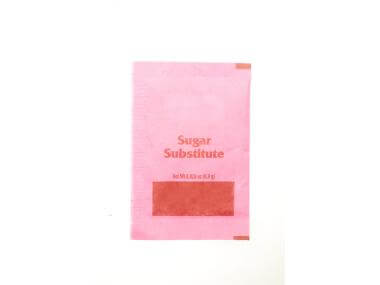Will Using Artificial Sweeteners During Pregnancy Affect Your Kid’s Weight?
A new study finds that using artificial sweeteners during pregnancy is linked to higher BMIs for the kids. But does this have anything to do with the sweeteners?
There’s more bad news for manufacturers (and defenders) of artificial sweeteners. A study published this fall in the International Journal of Obesity reports that the consumption of diet soda or use of the noncaloric sweeteners Nutrasweet or Equal during pregnancy is associated with higher Body Mass Index (BMI) and fat mass in those children, from babyhood all the way through early adulthood. Use of zero-calorie sweeteners during pregnancy is not uncommon, by the way. About a third of pregnant women report using them on any given day.
This latest study followed about 1700 women from Massachusetts. About 70% of them were white and the average BMI before pregnancy was 24.6—just shy of what would be considered overweight. They asked the women to indicate how often they used artificial sweeteners or drank diet soda during the first two trimesters of pregnancy. Then they followed the children from birth to the age of 18, recording their BMI and body fat.
The researchers adjusted the data to account for a whole slew of things that could potentially skew the findings—including the mother’s pre-pregnancy BMI, age, race/ethnicity, education, previous pregnancies, pre-pregnancy physical activity, smoking, and the dad’s BMI and level of education. And after taking all that into account, they still found that kids born to moms who consumed artificial sweeteners one or more times a day during their pregnancies had higher BMIs and higher fat mass compared to kids whose moms consumed little to no artificial sweeteners. The differences grew larger as the kids got older.
All together now: Correlation is not causation
Now, if I were in charge of public relations for artificial sweeteners—which I’m not—I would point out that this is merely a correlation and does not prove that artificial sweeteners had anything to do with these kids’ weight or body composition. Although they collected a lot of information about the parents and used that to adjust their analysis, the researchers collected virtually no information about the diet or lifestyle of the kids over the subsequent 18 years. You could argue that what the kids ate and how much physical activity they got throughout their lifetime had a lot more to do with their body weight than whether their moms drank diet soda while pregnant. And you wouldn’t be wrong.
Are kids whose moms drink diet soda more likely to drink diet soda themselves? I can’t find any data to support that (which doesn’t mean that it doesn’t exist), but it seems likely. For sure, kids are consuming more artificial sweeteners than they used to. About 25% of kids report consuming them on a daily basis. And the proliferation of low- and no-sugar products in the marketplace may be an additional source of these sweeteners that neither kids nor parents are even aware of.
There are data to suggest that kids who consume artificially sweetened soft drinks end up consuming more carbohydrates and calories than kids who drink water, even though the drinks themselves do not contain carbs or calories. However, it is theorized that the hyper-sweetness of these beverages, especially when introduced early in life, may lead to a more intense desire or preference for highly sweetened foods and beverages.
There are also studies indicating that these zero-calorie sweeteners may change the makeup of the microbiome in ways that tilt the body’s metabolism and appetite regulation toward weight gain. And where do babies get their microbiomic starter kit? From their mothers. Or at least, those born through vaginal delivery do. (The study did not include data on how many of the babies were born via Cesarean section.)
So, while correlation does not prove causation, there are some plausible mechanisms that could be further investigated here. In the meantime, much to the sorrow and frustration of diet soda makers, the reputation of artificial sweeteners as a healthy alternative to sugar-sweetened beverages continues to decay.
And consumers are paying attention. Sales of diet soda have been declining steadily for years—even more rapidly than sales of sugar-sweetened beverages. But our love affair with bubbles continues. As I’m sure you’ve observed in your local grocery store, the fastest growing sector of the beverage market these days is flavored but unsweetened carbonated water. And so far, it appears that these offer a perfectly safe and healthy alternative to sweetened and artificially sweetened beverages. I’m still a big fan of my at-home carbonator, which turns filtered water into sparkling water for a fraction of the cost and environmental impact.
But what about stevia?
Finally, I know that many of you have replaced artificial sweeteners with more natural zero-calorie sweeteners made from stevia, monk fruit, and sugar alcohols. No doubt you’re wondering how or whether this latest research might apply to those sweeteners. In a word: it doesn’t. The researchers did not collect data on these newer nonnutritive sweeteners and limited their analysis to the artificial sweeteners that are most widely used in diet sodas.
I’ve talked about these other sweeteners in previous episodes, however. Limited data suggests that stevia and other plant-based zero-calorie sweeteners do not have the same negative effects on the microbiome as the artificial ones. But to the extent that exposure to hyper-sweet substances affects your desire or appetite for sweet things, or blunts your enjoyment of less intensely-sweetened foods like fresh fruit, I’d still be a bit cautious about the use of even the natural options.
What’s a moderate amount for noncaloric sweeteners?






